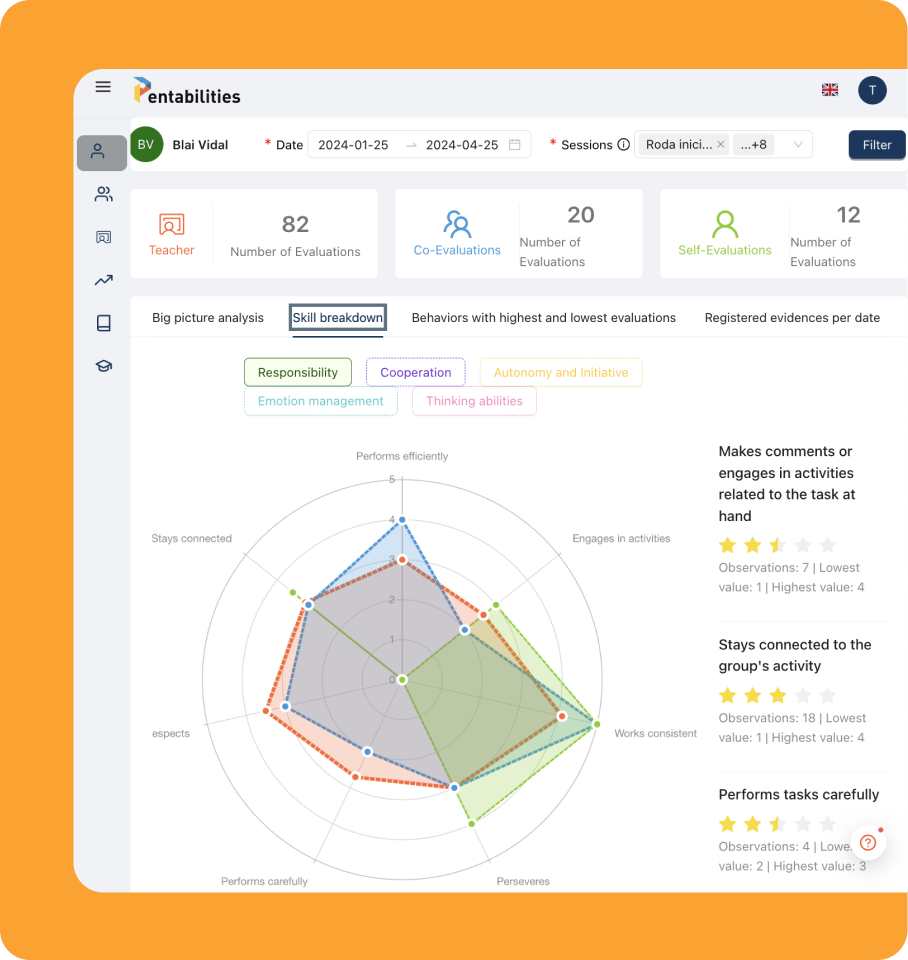Pentabilities methodology
We integrate the development of the 5 socioemotional skills into classrooms of any discipline. In this way, we improve classroom attitude and the educational results of students.
And, what are socioemotional skills?
They are the foundation of our work. Click on each of them and discover the behaviors that define them.
Responsibility
Self-discipline to stay focused on a goal and maintain determination and dedication to the tasks at hand.
- Works in a constant manner
- Stays connected to the gtroup’s activity
- Makes comments or engages in activities related to the task at hand
- Performs tasks efficiently
- Performs tasks carefully
- Perseveres in the face of difficulties
- Respect the rules
Cooperation
It includes behaviors that facilitate group work: actions related to participation, active listening, shared decision-making, and conflict resolution.
Associated behaviors:
- Listens to others
- Incorporates what others say
- Encourages peers’ participation
- Engages in group decision making
- Facilitates conflict resolution
- Recognizes personal responsibilities and those of others
- Helps peers selfleessly
Autonomy and initiative
Autonomy means having the ability to work independently, without the need for supervision, and seeking help only when necessary.
Initiative reflects the confidence to take action: proposing ideas and finding solutions when needed.
Associated behaviors:
- Brings up ideas
- Asks questions when stuck
- Plays an active role in group decision making
- Is able to convince others of his | her approaches
- Works with determination
- Believes that he | she can iniatiate changes
Emotion management
It involves being aware of one’s own and others’ emotions, and managing them appropriately.
Associated behaviors:
- Transmits cheerfulness
- Remains calm under pressure
- Controls emotions when conflict arises
- Accepts the possibility of making mistakes
- Accepts that his | her approaches do not prosper
- Adapts behavior to the circumstances
Thinking abilities
They enable the acquisition and processing of information to build and organize knowledge, making it applicable in different situations. They involve intellectual inquiry, ideas generation, and metacognition.
Associated behaviors:
- Relates new content with previous knowledge
- Makes good reflections on the content
- Makes good reflections on internal personal processes
- Asks good questions (to improve understanding or to move forward)
- Has creative ideas (explores alternative paths)
- Proposes good strategies for problem solving
- Plans and prioritizes tasks
- Willing to discover different perspectives
- Expresses ideas effectively (correction, precision and structure)
Difference between behaviors and skills?
The 5 big skills have 35 associated behaviors that define them. Behaviors are the actions that take place in the classroom and that condition the well-being and learning of students.
Pentabilities implementation
The implementation of Pentabilities is done through a cycle that is valid for all subjects, areas, and projects.
-
1. Selection of learning objectives
Socio-emotional and academic learning objectives are defined.
-
4. Analysis of behaviors
The data recorded for each student, skill/behavior, or group is analyzed and visualized, and individual reports are generated.
-
2. Design and planning of activities
Activities that integrate academic objectives - what we want students to learn - and socio-emotional objectives - what behaviors students need to activate in order to benefit from the activity and achieve the learning objectives - are planned.
-
5. Reflection on behaviors
Thanks to the data, students reflect, individually or in groups, on the impact of their behaviors and set future steps for improvement.
Teachers can adapt planning and methodology based on the behaviors observed.
-
3. Observation and recording of behaviors
Teachers record the behaviors observed in students, as planned through the Pentabilities app, and save time for students to perform self-assessment and peer assessment during the activities.
How is it implemented in schools?

02
We introduce the app to select improvement objectives and record evidence in the classroom.
03
We offer the possibility of accompanying the teacher with classroom observations and a conversation to facilitate the transition from theory to practice in the classroom.
04
We provide support through resources and online assistance.
05
Schools inform us of the good results in three areas: academic, student attitudes and reflections, and educational quality.
The platform
How to use the platform?
-
Conduct assessments
Participate in assessments along with other teachers and students.
-
View behavior data
Visualize the individual and group data recorded by teachers and students.
-
Analyze data for informed planning
Use the platform's intuitive data analysis tools to improve planning and the dynamic management of educational activities.
-
Generate personalized reports
Receive personalized reports on students to facilitate self-awareness, reflection, and effective feedback sessions.
